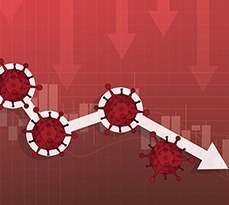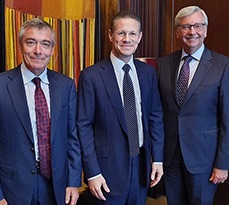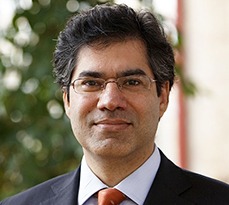The news and insight section of Cambridge Judge Business School’s website attracts audiences with eclectic interests ranging from business to healthcare to the arts. In 2020, attention was focused on articles related to the COVID-19 pandemic.

Confirming behaviour
13 January 2020
Chief executive officers receive plenty of advice – from company boards, employees, financial analysts and others – and are paid the big bucks to sift through such recommendations to make tough decisions.
But how do CEOs actually receive all this advice? That’s the topic of a paper published in the Journal of Management co-authored by Professor Yasemin Kor of Cambridge Judge Business School, which is based on a review of 65 studies in high-impact academic journals or which have been heavily cited.

Why your lack of a commute during the coronavirus pandemic could make it harder to work
24 March 2020
Working from home due to the COVID-19 pandemic means no commute – but what seems like a relief may actually not be such a good thing for some people. A study co-authored by Dr Jochen Menges of Cambridge Judge Business School finds that commuting time can be a useful period of “role transition”.
Around the globe, people commute to work an average of 38 minutes each way – or at least they did before the coronavirus pandemic ushered in a new era of working from home, however temporary. While this may have a positive impact in terms of reducing air pollution and carbon emissions, this sudden loss of commuting time may not be such a good thing for many people.

Managing through ‘perspective-taking’ in the coronavirus era
26 March 2020
Everyone is adjusting to life during the COVID-19 pandemic (writes Dr Thomas Roulet). For many, working from home is the new normal and poses all sorts of new challenges. Anyone in a position of management has, overnight, lost many of the tangible aspects of doing their job – particularly the non-verbal aspects of communication and how we interact in space, in person.
It is essential that managers are attuned to the various personal needs of their colleagues at this time. The boundaries between work and personal life erode when we work from home and everyone will experience this situation in a different way, depending on their family situation, their dependents, and the various dimensions of their personalities.

Long-term effects
31 March 2020
There are five key long-term changes to business stemming from the coronavirus crisis, says Dr Philip Stiles of Cambridge Judge.
Business leaders need to develop greater resilience in their firms through greater reserves; working from home is here to stay for many people, so firms need new policies such as ensuring that promotion decisions reflect this new reality; the value of key workers has been recognised, so policymakers need to reflect this through legislation to better protect them; employees can and do adapt, but managers have to recognise this through greater transparency and more supportive policies; finally, leaders need to listen, show “deliberate calm” and demonstrate compassion – as such leadership traits will be remembered long after the current crisis abates.

Better video chat
2 April 2020
Human beings are surprisingly good at drawing inferences from the behaviour of others, even based on cursory observations (writes Professor Mark de Rond). Over millennia of social evolution, we have developed ways to effectively co-ordinate with other human beings through facial expressions, verbal cues, gestures and scent. They “work” because typically we are able to connect with others face to face.
The global “lockdown” owing to COVID-19 has forced many of us to work in teams while working from home. One of the many challenges this poses is obvious: without the ability to communicate face to face, how can we help teams perform at their best?

Economic impact
19 May 2020
The GDP@Risk over the next five years from the coronavirus pandemic could range from an optimistic loss of $3.3 trillion (0.65 per cent of five-year GDP) under a rapid recovery scenario to $82.4 trillion (16.3 per cent) in an economic depression scenario, says the Centre for Risk Studies at Cambridge Judge.
Under the current mid-range consensus of economists, the GDP@Risk calculation would be $26.8 trillion or 5.3 per cent of five-year GDP, says a “COVID-19 and business risk” presentation prepared by the Centre for Risk Studies.

Low returns
2 June 2020
The “Generation Z” born between the mid-1990s and early 2010s will likely face a future of very low annualised real investment returns of about two per cent, Professor Elroy Dimson of Cambridge Judge Business School told a webinar organised by the CFA Institute.
The presentation by Elroy is based on historical data in his co-authored comprehensive global review of investment returns in 23 different countries, which now covers 120 years from 1900 through 2019.
Waste not

5 June 2020
Plastic has become a malevolent symbol of our wasteful society. It’s also cheap, durable, flexible, waterproof, versatile, lightweight, protective and hygienic. During the COVID-19 pandemic, plastic visors, goggles, gloves and aprons have been fundamental for protecting healthcare workers. But how are we to balance our need for plastic with protecting the environment?
Released on 5 June 2020, World Environment Day, a new film considers how society might “reset the clock” when it comes to living better with a vital material. “When we talk about the circular economy model, it is basically about using as little plastic as possible, but if plastic is to be used the important thing is to recycle and repurpose it,” says Dr Khaled Soufani, Director of the Circular Economy Centre at Cambridge Judge.

Centre for Strategic Philanthropy established at Cambridge Judge, dedicated to high-growth markets
24 June 2020
A new Centre for Strategic Philanthropy has been established at Cambridge Judge, dedicated to examining strategic philanthropy within and from the world’s highest-growth markets, including Africa, Developing Asia and the Middle East, at a time when philanthropy’s role in building social and environmental resilience is seen as increasingly essential.
Through a combination of rigorous research, executive education and the convening of diverse stakeholders, the Centre aims to become the leading hub of actionable knowledge to catalyse even greater philanthropic impact from the world’s fastest growing regions. The Centre will also work with relevant institutions and practitioners in these regions to encourage collaboration and insight-sharing.

Racism and inequality: ‘a good time to act’
6 July 2020
A passive approach will not address the sweeping racial injustice in jobs, incomes and outcomes that has manifest in recent protests around the world, Dr Kamal Munir of Cambridge Judge said in a much-watched webinar.
Kamal’s presentation, backed up by evidence from more than a dozen academic studies over the past two decades, said that while many organisations are happy to condemn racism as an “abstraction”, few people of the Black community and other minority ethnic backgrounds hold top positions.

Mental health
13 July 2020
People who have or had COVID-19 symptoms are more likely to develop general psychiatric disorders and are lonelier, with women and young people more at risk, says a just-published study co-authored at Cambridge Judge.
Having a job and living with a partner are significant protective factors against general psychiatric disorders and loneliness, says the study in the journal Psychiatry Research, based on 15,530 UK respondents, which is described as the first such large-scale, nationally representative survey in a developed country.

More with less
23 July 2020
The need for quick and inventive solutions to the COVID-19 pandemic has sparked a wave of “frugal innovation” initiatives around the world, says Professor Jaideep Prabhu of Cambridge Judge.
“I’ve been struck during this pandemic how this kind of frugal innovation is happening in many different areas, and not just in developing countries,” Jaideep said in a 8 July webinar entitled “Frugal Innovation and COVID-19: How to do More (and Better) With Less”.

Remote culture
10 August 2020
Organisational culture is more than a mere “statement of values” but instead reflects the practices and expectations of people working together, says Professor Jennifer Howard-Grenville of Cambridge Judge.
Culture in a company is best considered in the way “an anthropologist would consider a culture: which is the way this group of people go about doing what they do,” Jen told a webinar at the Business School. ”Anthropologists study culture – they watch practices – but it’s only by living with people and living like them that we can unpick the beliefs that support these practices.”

COVID-19 economic impact
2 December 2020
The coronavirus pandemic will likely reduce real world GDP by three per cent by the end of 2021 below pre-crisis predictions, with “deeper and longer-lasting” effects likely in the US and UK compared to China and other emerging Asian economies, says a new study co-authored by Dr Kamiar Mohaddes of Cambridge Judge.
The paper says the pandemic “will lead to a significant fall in world output that is most likely long-lasting”, with no country being able to shield itself from the adverse economic effects of COVID-19 by following less stringent lockdowns.

Fintech growth during COVID-19
3 December 2020
A global study jointly authored by the Cambridge Centre for Alternative Finance, The World Bank and The World Economic Forum reveals 12 out of 13 fintech sectors have grown during the first half of 2020 compared to the same period in 2019. But that growth is uneven and firms are facing significant headwinds in operations and fundraising.
The study reveals that the global fintech industry has continued to grow amid the pandemic, with 60 per cent of surveyed firms having either launched new products or services or revamped existing ones. However, the growth is highly uneven across business models, regions and national markets.


